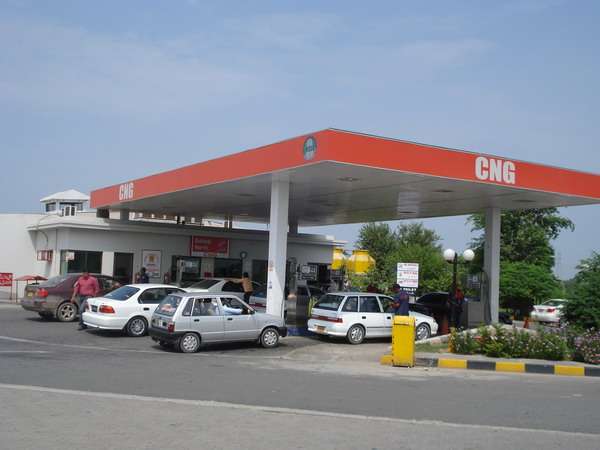 ECC lifts ban on CNG kit imports
ECC lifts ban on CNG kit imports
ISLAMABAD: Even as gas supply to CNG stations is down to just 18 hours a week, the Economic Coordination Committee (ECC) on Friday lifted a ban on the import of CNG kits and cylinders for factory-fitted vehicles, but deferred a decision on gas tariff, ostensibly to avoid taking an unpopular decision in Ramazan.
Chaired by Finance Minister Ishaq Dar, the ECC also deferred a proposal from the Ministry of Petroleum and Natural Resources to increase CNG prices for consumers by another Rs5.50 per kilogram to placate CNG operators.
Know more: New CNG schedule rejected
The committee also lifted a ban on the import of live animals from countries declared to be at ‘negligible risk’ from mad cow disease.
The ECC did sugar mills a favour by extending the deadline for the export of 250,000 tons of sugar until October, despite their having missed previous deadlines thrice. It approved the supply of wheat flour for internally displaced persons (IDPs).
“We appreciate your business-friendliness in the truest sense and understand that you want businesses to grow. But we also have to look at things from a political angle,” Finance Minister Ishaq Dar was quoted by a participant as having said to Petroleum Minister Shahid Khaqan Abbasi.
Mr Abbasi was pleading for an increase in the consumer tariff, as approved by the regulator. He said consumer gas prices could not be notified unless the ECC took a decision and insisted on one, because it involved the financial health of the gas companies and was a legal requirement for the gas price adjustment with effect from July 1.
“We cannot afford new controversies at this stage,” said Mr Dar and directed that discussion on matters relating to the consumer gas tariff, a change in gas losses, efficiency standards and CNG tariff be deferred. Sources privy to the development said Mr Dar was simply unwilling to take decision on issues that had attracted the attention of the judiciary in the past and a few cases were still pending at various stages involving two former prime ministers and a former chairman of the Oil and Gas Regulatory Authority. They said the issue was on the backburner for at least one month.
The finance minister issued clear cut instructions that any case involving subsidies should not be brought up before the ECC unless its budgetary implications were clearly spelt out in the summary. He said that once a decision was made by the ECC, the secretary concerned was responsible to follow up the decision and ensure its implementation.
He ordered the ministries concerned to submit their summaries well in advance, along with the necessary background information, to enable the departments concerned to provide their input before a decision was reached. He said that the mover of the summary should be fully updated and able to answer any supplementary questions.
CNG kits
At the request of the Petroleum Ministry, the ECC allowed the import of CNG cylinders, kits and related parts for the conversion of vehicles at manufacturing and assembling facilities of original equipment manufacturers because an Italian firm had set up a factory in Pakistan for export purposes.
The ECC had refused to lift the ban on import of CNG kits, cylinders and parts in January, citing gas shortage. The CNG sector was, at the time, getting gas 72 hours a week. This is now down to 18 hours.
The ECC ordered the ban be lifted when Ogra reported that it was resulting in the production of low-quality local cylinders, which are a major health risk.
Wheat distribution
The committee approved the immediate release of 60,000 tons of wheat for distribution among IDPs from North Waziristan, at an estimated cost of Rs2.28 billion. A committee, to be headed by SAFRON Minister Abdul Qadir Baloch, was constituted to determine a wheat distribution mechanism. Textile Minister Abbas Khan Afridi, the secretaries from the ministries of National Food Security and Commerce and a representative of the KP governor would also be members of the committee.
Live animals
At the request of the Ministry of Commerce, the ECC lifted a ban on the import of live animals from countries declared to be at ‘negligible risk’ by the World Animal Health Organisation.
It was also decided that animals from only those herds that have had no reported case of mad cow disease for the last 11 years and have been duly certified by the veterinary authority of the exporting country, would be allowed for import.
Sugar export
Despite rising sugar prices in the domestic market, the ECC extended the deadline for the export of 250,000 tons of sugar up to Oct 31. It decided to extend the shipment period from 45 to 90 days for export and reduce advance deposit from 25 per cent to 15 per cent.
The committee ordered that there will be no confiscation of advance deposits of the exporter if they fulfilled their quota in 90 days.










Add comment